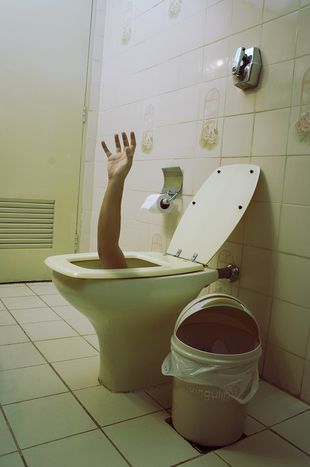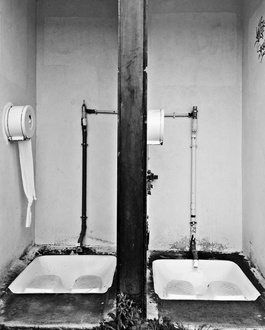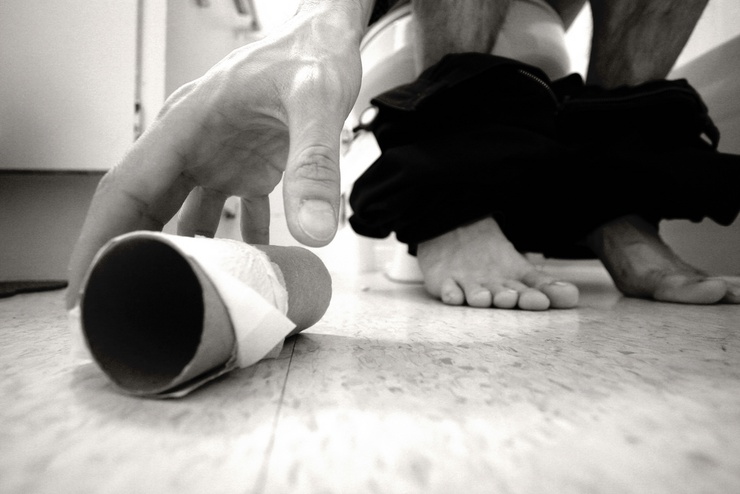
Do 'Turkish toilets' deserve their name?
Published on
Translation by:
 hkeet
hkeet
There are many clichés that Europeans attribute to the Turks. One which emphasises a common and biased stigma comes from the French language - about a facility called the 'squat toilet' which technically also has Bulgarian, Greek or Japanese roots...
In the clichéd Turkish family I envision the father spitting nicotine like a locomotive all day long. This is wrong. Instead, I get the version of the bold American writer, a hashish smoker called William Hayes, in the middle of his seventies-era Midnight Expressmission - his attempt at escaping an Istanbul prison. It definitely isn’t our aim to come across a Turk born across the Atlantic.
Stigmatising Turks
Luckily I had previously met the rest of the Turkish archetypal fraternity: from the Turkish Delight-making grandmother to the thick moustachioed grandfather. Let’s not forget the mother wearing a veil from head to toe and the son, an ardent fan of Atatürk, the founder of the secular Turkish republic in 1923. Finally there is the daughter, a perceptive devotee to the hammam and belly dancing.
 In reality, stigmatising the Turks is a popular 'social game', greatly appreciated by those between the ages of seven to seventy-seven across all of France. In general, the simplest trick to adopt in order to win here consists of attacking the so-called 'Turkish' toilets. When somebody with a full bladder is confronted with a simple hole dug into the ground acting as a latrine, their first instinct is to cry: 'Oh my God! These toilets must be Turkish, it’s not exactly Byzantium in terms of hygiene!' However, it has been said that it’s Bert Vandegeim who invented these charming sanitary facilities in his medieval native Belgium. In order not to mess up his trousers, he allegedly knotted them around his head like a turban before crouching in a batrachian position above his business. Seeing him wear this headgear, his company, in fits of laughter, allegedly compared him with an Ottoman padischah, thus baptising the newly thought up toilets as Turkish.
In reality, stigmatising the Turks is a popular 'social game', greatly appreciated by those between the ages of seven to seventy-seven across all of France. In general, the simplest trick to adopt in order to win here consists of attacking the so-called 'Turkish' toilets. When somebody with a full bladder is confronted with a simple hole dug into the ground acting as a latrine, their first instinct is to cry: 'Oh my God! These toilets must be Turkish, it’s not exactly Byzantium in terms of hygiene!' However, it has been said that it’s Bert Vandegeim who invented these charming sanitary facilities in his medieval native Belgium. In order not to mess up his trousers, he allegedly knotted them around his head like a turban before crouching in a batrachian position above his business. Seeing him wear this headgear, his company, in fits of laughter, allegedly compared him with an Ottoman padischah, thus baptising the newly thought up toilets as Turkish.
'Washiki' to the streets
Were they aware of how this qualification could be insulting to this empire? In terms of inconvenience, the traditonal Japanese toilets seem to be far worse than those that have been renamed 'alla turca'. Also known as 'washikis', they force the user to adopt an almost fœtal position as the least perilous in order to relieve himself. On the contrary, the Turks do not do their business in such an uncomfortable way. They even boast that they have only copied the most hygienic aspect of their sanitary facilities from the Japanese: the rinsing water jet after flushing which allows them to save kilometers of toilet paper each year.

However, the Turks do not seem to suffer from these rumours which have been spread against their bathrooms. Actually, most of them say the Spartan hole comes from their Greek neighbours. Even if it is more certain that the Greek philosopher Diogenes took pleasure in defecating on the floor, the Hellenic people nevertheless prefer to think that it was the Bulgarians who dug the first crater into the ground for urinating purposes. In short, the French are not only turning their noses up at these toilets which they claim to be 'Turkish', they are also turning a deaf ear to them. This is why the Gallics are rarely aware of the fact that our English and Dutch friends thought the inhospitable toilets were French rather than Turkish, their convictions confirmed by their repeated unpleasant experiences of using service stations in France.
The French refuse to accept Turkey as it really is
So do Turkish toilets deserve their name in French, 'toilettes à la turque'? Luckily, there is an expression in the Turkish language which allows us to evade the answer once again. Franzız kalmak, literally 'staying French', actually means to remain unfamiliar with a phenomenon, to not understand the real subject of a conversation. In other words, too happy lounging in the cocoon of idle gossip and commonplaces, we refuse to accept Turkey as it really is. Unless we are dreading the discovery that the European delegates of Turkish origin in Brussels or Strasbourg would make, when on leaving the semi-circular auditorium to go to the toilets, they would be led to a ceramic embellished with a simple hole.
Images: main (cc) Vitor Sá; in-text (cc) alainmarie2; (cc) TheGiantVermin/ all via flickr
Translated from Foire du trône : il s'en dit des trucs sur les Turcs


